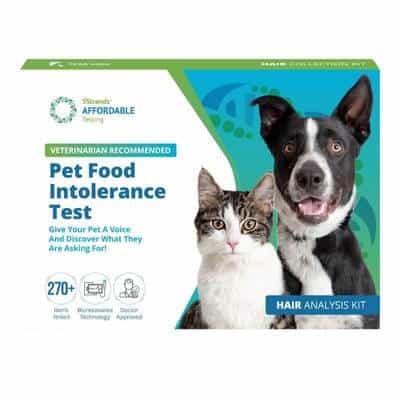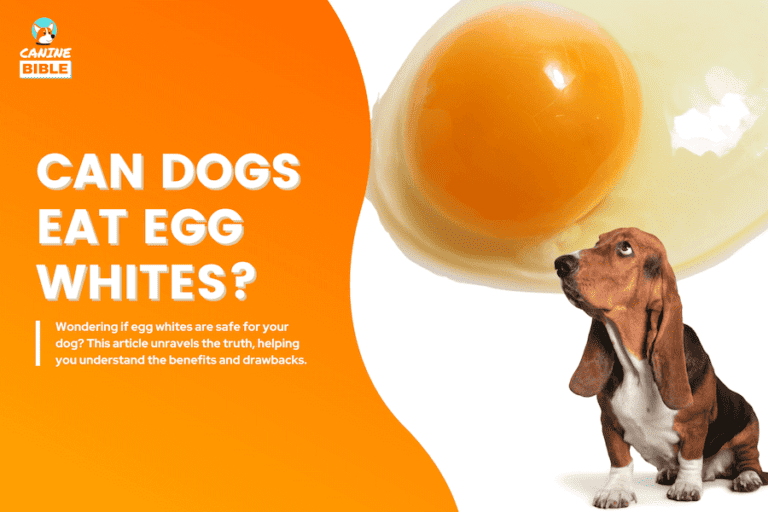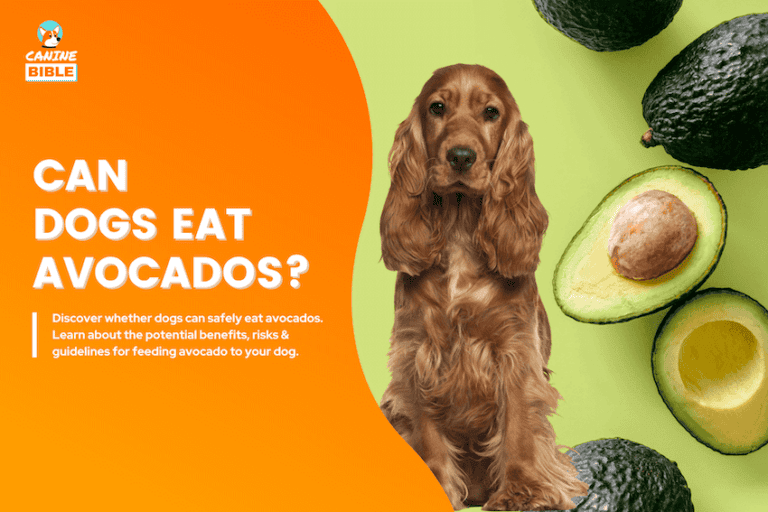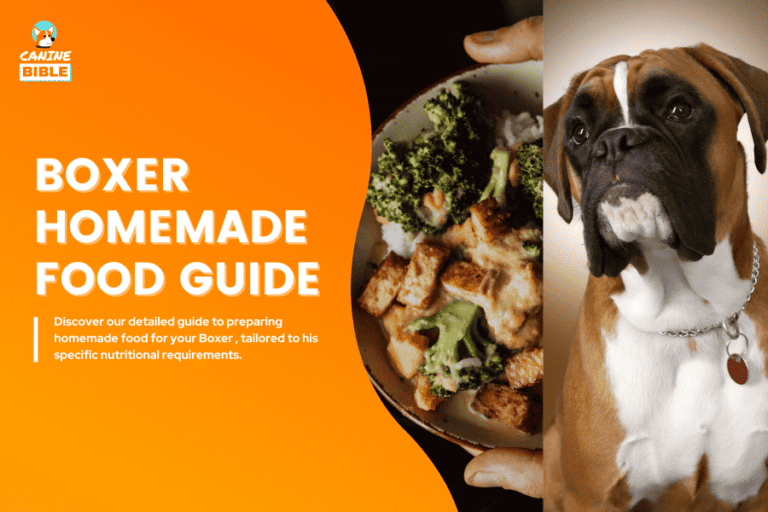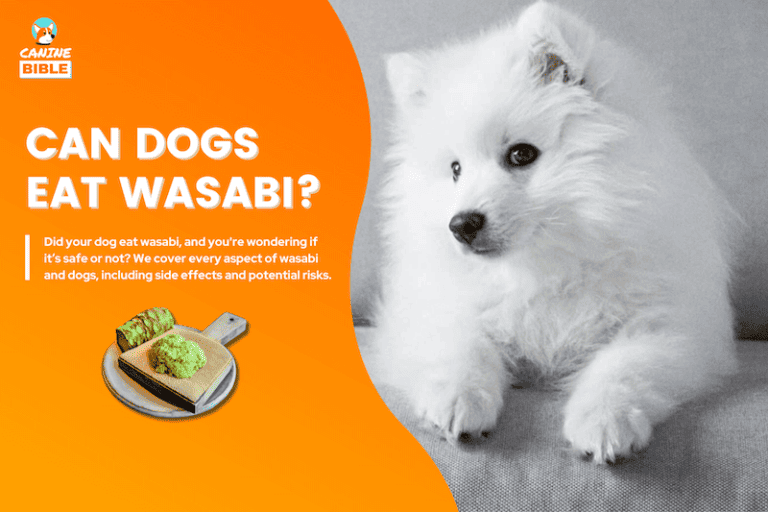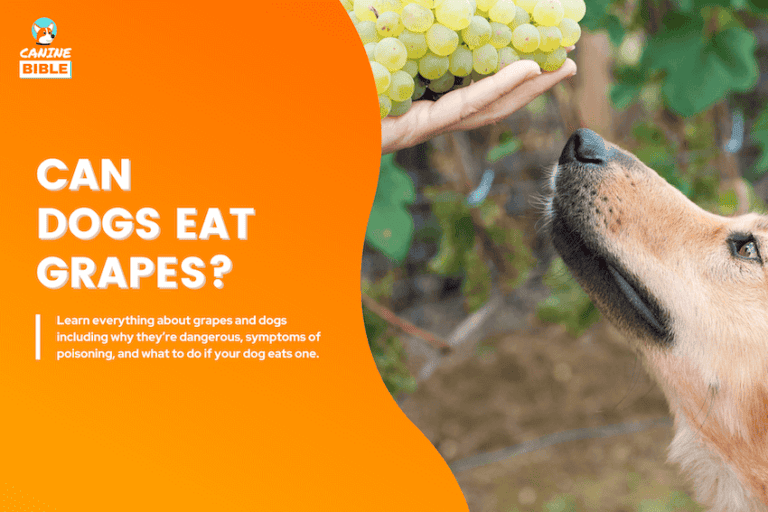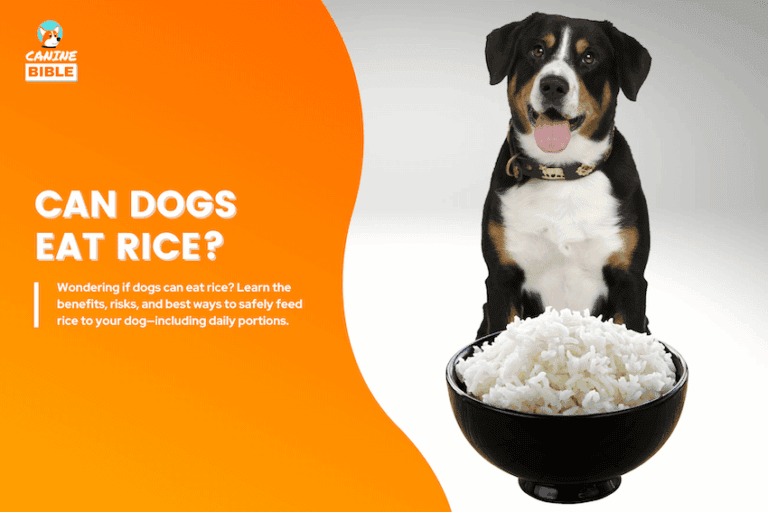The Complete Guide to Dogs Eating Popcorn: Toxic or Safe?
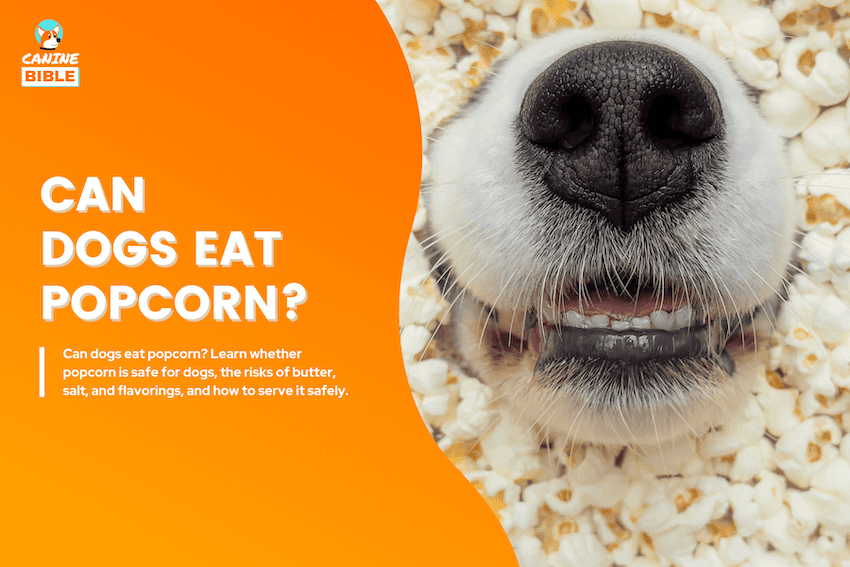
Canine Bible is reader-supported. We receive affiliate commissions via some of our links. Learn more.
Yes, dogs can eat popcorn, and this popular snack can be a crunchy and enjoyable treat for your pup. But before you start sharing your bowl, there are a few important things to consider. While plain, air-popped popcorn is generally safe in moderation, added butter, salt, and seasonings can pose health risks. Plus, what about unpopped kernels? Can flavored or microwave popcorn be harmful? This guide will explore the benefits, potential risks, and the safest way to incorporate popcorn into your dog’s diet.
Is Popcorn Good For Dogs?
Yes, plain, air-popped popcorn can be a safe and enjoyable snack for dogs in moderation.
Always ensure you feed plain, unsalted, and unbuttered popcorn. Avoid microwave popcorn or varieties with added oils, butter, salt, or flavorings, as they may be harmful to dogs. Also, remove unpopped kernels, which can pose a choking risk or damage teeth.
Benefits
100 grams of plain, air-popped popcorn contains the following nutrients:
Popcorn Nutrition Chart (100g)
Nutrient Analysis
| Component | Description | Nutritional Value (per 100g of Air-Popped Popcorn) | Safe for Dogs? |
|---|---|---|---|
| Water | Minimal moisture content | 4g | ✅ Safe |
| Calories | Provides energy | 387 kcal | ✅ Safe (in moderation) |
| Carbohydrates | Main energy source | 78g | ✅ Safe |
| Fiber | Aids digestion | 15g | ✅ Safe |
| Protein | Supports tissue repair and maintenance | 13g | ✅ Safe |
| Fat | Low in fat if air-popped | 4.5g | ✅ Safe (if unsalted & unbuttered) |
| Iron | Supports oxygen transport | 2.7mg | ✅ Safe |
| Magnesium | Supports muscle and nerve function | 144mg | ✅ Safe |
| Phosphorus | Supports bone and teeth health | 358mg | ✅ Safe |
| Salted, Buttered, or Flavored | May contain harmful additives like salt, butter, or artificial flavoring | — | ❌ Unsafe (stick to plain only) |
| Unpopped Kernels | Hard and can cause choking or dental damage | — | ❌ Unsafe (remove before serving) |
| Overconsumption | Can lead to bloating or stomach discomfort | — | ⚠️ Limit intake |
Risks & Considerations Before Feeding Popcorn to Dogs
While plain, air-popped popcorn can be a safe and fun treat for dogs in moderation, there are several risks and considerations to keep in mind before sharing it with your canine companion:
Are Dogs Allergic to Popcorn?
Most dogs are not allergic to popcorn, and it’s generally considered safe for canine consumption. However, some dogs may develop an allergic reaction, as with any food. Food allergies in dogs typically manifest as itchy skin, hives, infections, and anaphylaxis (a medical emergency) in severe cases. If you suspect your dog is having an allergic reaction to any food, including popcorn, it is crucial to consult a veterinarian.
Additionally, conducting an at-home dog allergy test like the 5Strands can help determine if your dog is allergic or intolerant to certain foods. For a more comprehensive approach, consider an at-home dog gut health test, like the Embark Gut Health Test, which can provide deeper insights into your dog’s digestive health and immune function. These tests can help identify food sensitivities, bacterial imbalances, and other underlying issues contributing to allergies, allowing you to take proactive steps to prevent discomfort and support your dog’s overall well-being.
Risks
The following symptoms may indicate a bad reaction to popcorn.
What to Do If A Dog Reacts Badly to Popcorn
Dogs showing worsening symptoms, such as blood in their vomit or stool, difficulty breathing, weakness, or collapse, should be taken to the veterinarian immediately.
1. Contact a veterinarian immediately: Even if your dog seems fine, contact your veterinarian or an emergency pet poison hotline right away. This includes services such as the ASPCA Animal Poison Control Center at 1-888-426-4435 or the Pet Poison Helpline at 1-855-764-7661. If you can’t reach your vet, you can chat live with a registered online veterinary professional via our online vet chat or video chat support (24 hours a day, 7 days a week). You can also schedule an at-home veterinary appointment with The Vets, a mobile veterinary service that provides at-home vet care nationwide for just about everything.
2. Gather important information: When speaking to a vet, provide: Quantity consumed (estimate if unsure), time of ingestion, and dog’s weight and breed (to assess potential risk).
3. Follow veterinary instructions: The vet may suggest monitoring at home or emergency treatment at the clinic.
- Keep your dog calm and prevent them from eating anything else.
- Be prepared to transport your dog to the vet quickly if advised.
- Bring any remaining popcorn or packaging to help the vet assess the situation.
How to Safely Feed Popcorn to Dogs
When feeding popcorn to your dog, it’s important to follow a few simple guidelines to keep them safe:
Way to Feed Popcorn
As with any new food, it is recommended to start slowly and feed gradually, allowing the digestive system time to adjust.
How Much Popcorn Can Dogs Eat?
Treats should only constitute 10% of your dog’s diet, with the remaining 90% coming from well-balanced dog food. This guideline also applies to healthy treats like popcorn. Below, you’ll find general guidelines for safely portioning popcorn based on your dog’s weight.
| Dog Size | Popcorn Serving (Feed Occasionally) | Breed Examples |
|---|---|---|
| Extra-small (2-15 lbs.) | 1-2 pieces of plain, air-popped popcorn | Shih Tzu, Yorkies, Chihuahuas, Maltese |
| Small (16-25 lbs.) | 2-4 pieces of plain, air-popped popcorn | Boston Terriers, Beagles, Dachshund |
| Medium (26-60 lbs.) | Up to 5 pieces of plain, air-popped popcorn | Bulldogs, Basset Hounds, Border Collies |
| Large (61-90 lbs.) | Up to 7 pieces of plain, air-popped popcorn | Golden Retrievers, Pit Bulls, Boxers, Labrador Retrievers |
| Extra-large (91+ lbs.) | Up to 8 pieces of plain, air-popped popcorn | Bullmastiffs, Great Danes, Saint Bernards, Great Pyrenees |
Can Puppies Eat Popcorn?
Yes, puppies can eat popcorn, but only in moderation and in smaller amounts. Since puppies have more sensitive digestive systems, it’s best to start with just one or two pieces of plain, air-popped popcorn to see how they react. Feeding too much popcorn at once can lead to digestive upset, as puppies’ stomachs are still developing, and they may struggle to digest too much fiber or starch. Additionally, unseasoned popcorn is key—buttered, salted, or flavored popcorn can be harmful to puppies due to the added fats, sodium, and artificial ingredients. When introducing any new treat, including popcorn, avoid giving multiple new foods on the same day. Puppies may have food sensitivities or allergies, and if they experience any digestive issues, introducing only one new food at a time makes it easier to identify the cause. Try offering one or two pieces of fresh, air-popped popcorn, then wait a few days to observe how your puppy’s digestive system reacts before considering offering more. Always remove unpopped kernels to prevent choking or dental issues.
Alternatives
Here’s a list of alternatives to popcorn that are safer and nutritious.
Frequently Asked Questions
The Bottom Line
Yes, dogs can eat popcorn, but only when it is plain, air-popped, and served in moderation. While popcorn itself is not toxic, many commercial or flavored varieties—such as buttered, salted, cheddar, caramel, or microwave popcorn—contain unhealthy ingredients that can be harmful to dogs. If you choose to share popcorn with your pup, always remove unpopped kernels to prevent choking or dental issues, and limit servings to occasional treats, not a regular part of their diet. Overeating popcorn, even plain, can cause digestive issues such as bloating, diarrhea, or gas. For a safer alternative, consider dog-friendly crunchy treats or nutrient-rich snacks, such as carrots or blueberries. When in doubt, always consult your veterinarian before introducing new treats to your dog’s diet.
If you’re looking for other healthy snack options, check out the best dog treats to find safe and nutritious alternatives. You can also get creative in the kitchen with homemade dog treat recipes for a natural and wholesome reward. Are you curious about other common human foods? Learn if jelly belongs on your dog’s do-not-feed list.
Sources
Canine Bible authorship represents the unified voice of our entire editorial team and our in-house veterinarians rather than a single author. Each article, blog post, and review published under the Canine Bible name undergoes a rigorous review process, involving all team members to guarantee accuracy and up-to-date in accordance with the latest veterinarian research. This collaborative effort is an integral part of our editorial process and aligns with our four pillars of content creation. This approach ensures our content is backed by expert knowledge and factual information, offering our readers reliable, actionable, and trustworthy content.

